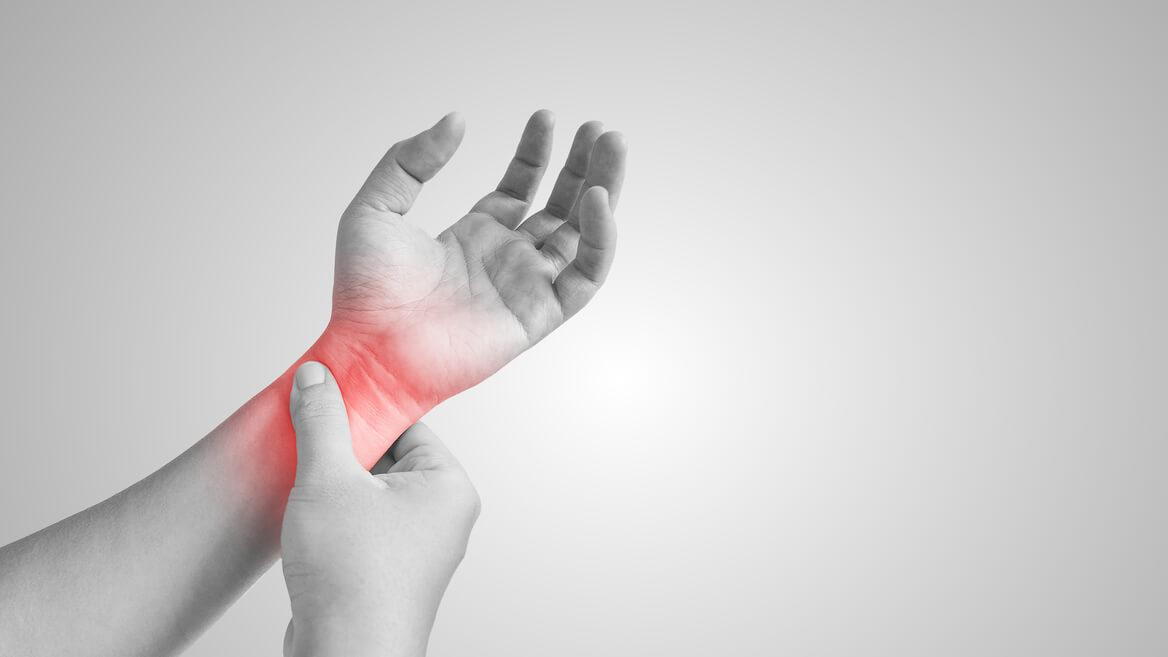
- posted: Aug. 12, 2021
- Chiropractic Care, Health & Wellness, Alleviating Pain
Carpal Tunnel Syndrome is a painful condition with a high chance of developing into a chronic stage if left untreated. But can chiropractic help? Find out by reading this article!
With prolonged computer use as one of its causal factors, CTS is more and more prevalent in 2021, especially with so many people working from home and reducing their exercise routine. The treatment for CTS typically includes anti-inflammatory medication administered orally or through injections in the affected area.
Wondering what chiropractic can do for Carpal Tunnel Syndrome? In short, it offers a more holistic approach, one that is completely drug-free and addresses its causing factors.
Chiropractic care can make a difference in treating Carpal Tunnel Syndrome because it is associated with anti-inflammatory treatment, and offers a long-term solution for managing this ailment. Let's look into what CTS is and why chiropractic care can do wonders for you.
What Is Carpal Tunnel Syndrome?
Before looking into how chiropractic can help, let’s first see what Carpal Tunnel Syndrome actually is.
Carpal Tunnel Syndrome is caused by prolonged compression applied to the median nerve when it goes through the narrow carpal tunnel in the wrist. When this happens, patients feel pain, weakness, or numbness in the affected hand. They usually find it difficult to pick up and hold objects and experience pain when using the affected hand.
There are many causal factors for Carpal Tunnel Syndrome. The most important among them are rheumatoid arthritis, diabetes, hypothyroidism, acromegaly, amyloidosis, and high blood pressure.
However, some lifestyle factors might also make patients more prone to developing CTS such as smoking, high salt intake, obesity, and a sedentary lifestyle (usually associated with high blood pressure).
Performing repetitive work with your hands will also make you prone to getting Carpal Tunnel Syndrome because it is likely to cause inflammation in the wrist and it’s usually associated with posture issues as well, which may, in turn, cause inflammation to the median nerve.
Repetitive work includes computer use but is not limited to it. Other types of repetitive work can cause CTS such as manufacturing, assembly line work, and construction work.
Can Modern Medicine Help?

For the treatment of Carpal Tunnel Syndrome, doctors rely on anti-inflammatory medication, which they can customize to the needs and limitations of the patient. However, anti-inflammatory usage may not be a long-term option in patients with underlying diseases, like those suffering from diabetes.
Alongside anti-inflammatories, treatment for CTS may include splinting or even surgical procedures to decompress the area and release tension on the median nerve.
The final component of the treatment for CTS includes reducing or even eliminating the causal factors, when possible. This may include lifestyle changes such as introducing diet and exercise to lose weight and avoid sedentarism. It may also include treating underlying conditions like high blood pressure and hypothyroidism.
By managing these conditions, Carpal Tunnel Syndrome can also be kept at bay.
Can Chiropractic Help With Carpal Tunnel Syndrome?
Yes, it certainly can. Chiropractic specializes in diagnosing and treating nerve entrapment syndromes, so chiropractors can easily identify Carpal Tunnel Syndrome and offer a holistic approach to treating it.
Most chiropractors will talk to patients about their lifestyle, work, and the other medical issues they might have to get a broad picture of how and where the compression of the median nerve occurred. They will also examine the patient's' posture to determine if inflammation in the spine, where the median nerve begins, could also contribute to the development of CTS.
Then, the chiropractor will develop a series of exercises customized to the specific needs of the patients. Aimed to reduce inflammation in the wrist, these also release other compression areas along the median nerve to ease pressure and, ultimately, pain.
Chiropractic Care Procedures For Carpal Tunnel Syndrome
While the precise exercise sequence must be customized to the specific case of each patient, here are some of the most commonly used chiropractic procedures for Carpal Tunnel Syndrome:
Flexion Stretch Of The Wrist
The patient will keep his palm facing down, and his wrist will be bent with his fingers towards the floor. The chiropractor will then straighten the arm and gently pull the hand towards the patient's body. This position must be kept for sequences of 15 seconds.
Extension Stretch Of The Wrist
The chiropractor will bend the patient's wrist backward as if he were signalling somebody to stop. Then, the chiropractor will pull the hand back, causing tension in the wrist. This position must be kept for sequences of 15 seconds.
Can You Reverse The Effects Of Carpal Tunnel?
With enough determination, yes, you can. When Carpal Tunnel Syndrome is diagnosed early and treated correctly, which includes working on reducing or eliminating some of the causal factors, it can be cured.
However, if left untreated, the CTS symptoms will worsen and become increasingly difficult to treat.
In some cases, when underlying diseases become causal factors (diabetes, high blood pressure, hypothyroidism), eliminating them becomes almost impossible. In these cases, Carpal Tunnel Syndrome may develop into a chronic condition. But even then, chiropractic care can make a difference because it provides pain relief without resorting to medication.
If you suffer from CTS and would like to give chiropractic care a chance, we are waiting for you in our Los Gatos office to discuss more about your condition. In the meantime, you might also find these articles useful:
Hours of Operation
8:00 am - 12:00 pm
3:00 pm - 6:00 pm
9:00 am - 12:00 pm
8:00 am - 12:00 pm
3:00 pm - 6:00 pm
3:00 pm - 6:00 pm
8:00 am - 12:00 pm
9:00 am - 11:00 am
Closed
